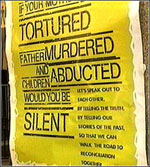 Bush’s defense of his phone-spying program has disturbing echoes of arguments once used by
Bush’s defense of his phone-spying program has disturbing echoes of arguments once used by
Back in the 1980s, when I was living in Johannesburg and reporting on apartheid
I thought about that neighbor this week, as reports dribbled out about President George W. Bush’s sanctioning of warrantless eavesdropping on American conversations. For anyone who has lived under an authoritarian regime, phone tappingor at least the threat of itis always a given. But U.S. citizens have always been lucky enough to believe themselves protected from such government intrusion. So why have they reacted so insipidly to yet another post-9/11 erosion of
I’m sure there are many well-meaning Americans who agree with their president’s explanation that it’s all a necessary evil (and that patriotic citizens will not be spied on unless they dial up Osama bin Laden). But the nasty echoes of apartheid South Africa should at least give them pause…
While Bush uses the rhetoric of “evildoers” and the “global war on terror,”
Botha was right about South Africa being under attack. Internally, blacks and a few whites were waging a low-level guerrilla war to topple the government. Externally, activists across the globe were mobilizing economic sanctions and campaigns to ostracize
For so many around the world, the United States is as much a symbol as a nation. Outsiders may scoff at American naiveté in thinking that their conversations are private, but they envy them for growing up in a society so sheltered that it made such a belief possible. Among those who feel this way is Archbishop Desmond Tutu, the South African Anglican leader who won a Nobel Peace Prize for his principled fight for justice in his native country. “It’s unbelievable,” he told me in an interview, “that a country that many of us have looked to as the bastion of true freedom could now have eroded so many of the liberties we believed were upheld almost religiously.”
Tutu recalled teaching in Jacksonville, Fla., when Bush won re-election in 2004. “I was shocked,” he said, “because I had naively believed all these many years that Americans genuinely believed in freedom of speech. [But I] discovered there that when you made an utterance that was remotely contrary to what the White House was saying, then they attacked you. For a South African the déjà vu was frightening. They behaved exactly the same way that used to happen herevilifying those who are putting forward a slightly different view.” Tutu made these comments to me exactly a year ago next week. I haven’t seen any reaction from him about the latest eavesdropping revelations, but I doubt he is remotely surprised at the
It’s not fair, of course, to suggest that all citizens are indifferent to violations of their privacy and their rights to free speech. Yet as I’ve watched this debate play out, it’s hard to avoid the conclusion that not enough Americans really care. Like my Johannesburg neighbor, they seem to hope that unpleasant news will disappear if you just ignore it. It didn’t then, and it won’t now.
(In accordance with Title 17 U.S.C. Section 107, this material is distributed without profit to those who have expressed a prior interest in receiving the included information for research and educational purposes. VT has no affiliation whatsoever with the originator of this article nor is VT endorsed or sponsored by the originator.)
ATTENTION READERS
We See The World From All Sides and Want YOU To Be Fully InformedIn fact, intentional disinformation is a disgraceful scourge in media today. So to assuage any possible errant incorrect information posted herein, we strongly encourage you to seek corroboration from other non-VT sources before forming an educated opinion.
About VT - Policies & Disclosures - Comment Policy



